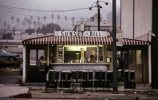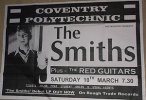1984
Well I guess the main place to start is my 21st birthday in February.
I asked my brother to get me The Smiths debut album on the basis of having bought This Charming Man (which wasn't on the album, though it was on the cassette) and liked the follow up single What Difference Does It Make?
At my party, I had a pre-prepared tape blasting out the best punk / new wave / electro pop tunes. I opened my present from my brother and sat there reading the lyrics on the inside sleeve and was blown away by how many songs I could have said were written for me. I wanted to stop the tape and put the album on, but at the same time wanted the first listen to be a personal listen, which it was the next afternoon after I had recovered.
I was blown away. Punk had instilled in me an attitude and shaped me politically. But here was a band that was reflecting what I was feeling inside, with all the late teen / early 20's insecurities and questioning one's self packed into 10 songs. This was a band for me.
The gig in March at the Free Trade Hall was sold out so I had missed out on the tour - or so I thought..... City played away at Brighton March 10th and on our way down on the Special, I noted in the NME's gig guide that The Smiths were playing at Coventry Polytechnic that evening AND the Special was stopping at Coventry to pick up / drop off the Leicester & Rugby supporters club.
A quick phone call from a phone box in Brighton to my mum / dad in Coventry, saying "leave the key under the plant pot, I'll be there 11pm" and I got off at Cov and walked to the Poly (Lanchester Poly). I arrive and the gig has sold out but this lad is next to the door with a spare ticket, face value and I am in. City and The Smiths all on the same day! What a day!
The Smiths also had the collaboration with Sandie Shaw as well as "Heaven knows...." and "William it was really nothing" as well as the great compilation of Peel sessions and outtakes "Hatfull Of Hollow" at the end of the year. Crazy to think this, but "How Soon Is Now?" was originally released as a B side to "William...." late 1984 before being released as a single in its own right the following year.
Lloyd Cole & The Commotions also hit the charts with singles "Perfect Skin and the glorious "Forest Fire", topping it with the album "Rattlesnakes", with the great "Are you ready to be heartbroken?"
Another band to break through was Bronski Beat. Sure there had always been gay artists around but apart from songs like Walk On The Wild Side or The Killing of George, not many artists actually covered the topic of homosexuality. "Smalltown Boy" haunting keyboard intro that runs through the song and subsequent video highlighting problems at home and violence on the streets became an anthem, not just for gay people, but also disaffected youth / young adults trying to make their own way in the world who just didn’t feel that they “fitted in.”
More gigs in the year saw two trips to the Apollo to see (again) Siouxsie & The Banshees and The Psychedelic Furs.
While The Smiths were on the record player repeatedly, one other album was released that was my album of the year and my 4th favourite all time album!
Echo & The Bunnymen unleashed "Ocean Rain" with the singles "The Killing Moon", "Silver" and "Seven Seas". From the stunning front cover the album has no duff tracks and still plays regularly in my car 41 years on.
Other tunes of the year, The Banshees "Dazzle" and "Swimming Horses", from the "Hyaena" album, Killing Joke "Eighties", The Cure "Caterpillar" Psychedelic Furs "Ghost In You" and "Heaven" and New Order, who were albumless during the year but still came out with "Thieves Like Us"
Over all a great year!
Three songs for the playlist?
Lloyd Cole & The Commotions - Forest Fire
Echo & The Bunnymen - Ocean Rain
The Smiths - Please Please Please Let me get What I want
View attachment 174380


